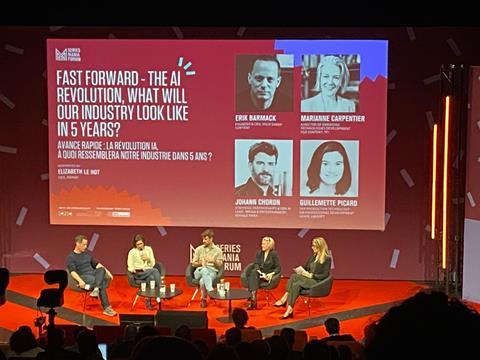The revolution is pretty dramatic and it’s already here, says a panellist at Screen Mania in Lille, France

Producers should embrace artificial intelligence to navigate the ‘existential’ challenges facing the film and TV industry, according to Erik Barmack, the founder of Los Angeles-based production and distribution outfit Wild Sheep Content.
Barmack, who headed international originals at Netflix until 2019, was speaking on an AI panel at Series Mania in Lille this week.
Barmack spoke of an existential challenge in Hollywood and in TV production amid viewer competition from digital platforms like YouTube and TikTok: “There’s a fear of people losing their jobs, and there’s a fear of television going away altogether for user generated content. The only way to sync those fears up is by using AI ethically and responsibly to bring the cost of television down without permanently destroying what it means to be in a creativity industry.”
He said Wild Sheep is involved in 10 productions around the world with a team of five people. These include Icelandic crime drama Fusion, presented at Series Mania’s Buyers Upfront this week.
“We’re competing with production companies that have hundreds of people. The only way to do that right now is using AI,” said Barmack.
He described how Wild Sheep is variously employing AI tools, incuding for script summaries. “We get 20 scripts a week. We used to have one person spend 20 to 30 hours a week doing script coverage. That work is done in five minutes now,” said Barmack.

AI Media News is the newly-launched publication from Broadcast, Screen Daily, and Global Data covering everything AI in the media industry. You can follow its Linkedin account here, and X here, and sign up to its weekly newsletter here.
Wild Sheep also uses AI for subtitling and dubbing to prepare early versions of cuts to send to partners and buyers around the world. “We used to have to wait until there’d be a finished cut of an episode before it would make sense to spend the money, a couple $1,000, on subtitling. Now, we’ll do that instantaneously.”
Barmack said all of Wild Sheep’s decks and presentations are created with the assistance of AI. The technology is also used to storyboard action sequences and to help with set design “so that directors are not spending time on set conceiving scenes they can already work through.”
“The revolution is pretty dramatic and it’s already here,” Barmack suggested. ”The dirty secret of Hollywood now is that 80 to 90% of the work that’s being done has already been impacted by AI in some way. It’s not a future that we’re heading to, it’s something that’s part of our day-to-day business. We can only continue our businesses in a profitable and productive manner by using these tools.”
Elsewhere on the panel, Guillemette Picard, vice president of production technology at French video games firm Ubisoft, said the speed of change in tech and AI is “phenomenal” and warned it is extremely hard for both individuals and companies to keep up.
She also warned of the financial and environmental costs associated with AI, and said businesses need to be “extremely picky” on how they use the tech. “It’s a tough transformation, and it’s extremely difficult to deploy.”
She said AI will lead to a “tsunami of content”, but those who emerge as winners will be the ones that “bet on differentiation and authenticity.”
Barmack also set out the pros and cons of AI. On the plus side, he said it can level the playing field for creatives around the world, opening up possibilities for those whose creativity might have been silenced.
“Hollywood tends to be an aristocracy. It’s very, very hard to get anything made, and you have to know the right people….So what happens if we allow millions of people from around the world to have access to the same tools?…It’s a stunning change in artistic freedom.”
On the downside, Barmack painted a picture of a “Matrix-like” future where “algorithms get better and better at feeding content that can be created without much thought…What happens if media is outside of our collective control and we lose the specificity of what it means to have a slanted story that’s well drafted. Everybody will just be cycling through information as quickly as possible. AI is going to accelerate that. And that scares me.”
This story was first published on AI Media News’s sister site, Screen Daily.







No comments yet